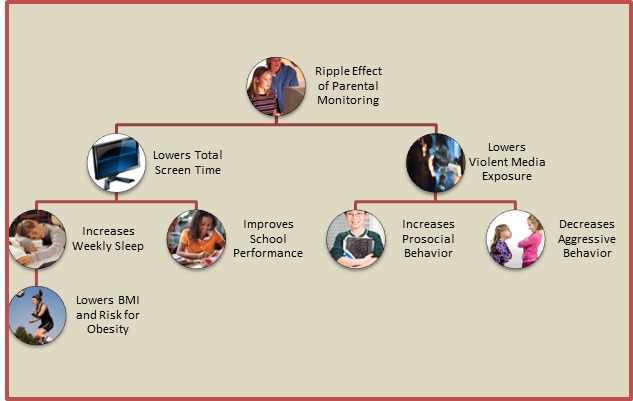
The ripple effect of decreased screen time and media exposure, via Iowa State University News Service
Is limiting children’s exposure to screens and media worth the effort? Yes it is, says new research from Iowa State University. According to a study that evaluated children over the course of a school year, decreasing children’s screen time creates a ripple effect, resulting in more sleep, better grades, and improved social behaviors. The researchers encourage parents to monitor their children’s screen usage, stating that parents have more power than they might think. The results also underscore the need for clinicians to discuss appropriate levels of media consumption with patients and their parents.
The researchers evaluated over 1,300 school children, once at the beginning of the school year and again seven months later. The students were recruited for the study as part an obesity prevention program. Students and their parents provided information through surveys about screen time limits, violent media exposure, bedtimes, and behavior. Teachers also participated by reporting on students’ grades and in-school behavior. School nurses aided the data collection by measuring the students’ height and weight.
Using a large sample made it possible to identify trends that might not have surfaced in an analysis of individuals. The researchers observed that limiting screen time and media consumption affects many aspects of students’ lives. Less screen time translated into direct benefits on sleep, academic performance, and behavior. Indirectly, decreased media consumption affected body mass index (BMI) because less screen time results in more sleep and children who sleep more have a lower obesity risk. The children were also exposed to less violent media, which was linked to increased prosocial behavior and diminished aggressive behaviors at the end of the study.
The researchers noted that parents may not notice the salubrious effects of reduced screen time right away. Lead author Douglas Gentile, associate professor of psychology, explains, “As parents, we don’t even see our children get taller and that’s a noticeable effect. With media, what we’re often looking for is the absence of a problem, such as a child not gaining weight, making it more difficult to notice.” Parents should know that even though they may not notice a difference, reducing screen time does impact their kids.
The American Association of Pediatrics recommends no more than two hours of screen time per day for children two and older.
This research is published in JAMA Pediatrics.
Previous news in sleep:



 © 2025 Unyte Health US Inc.
© 2025 Unyte Health US Inc.